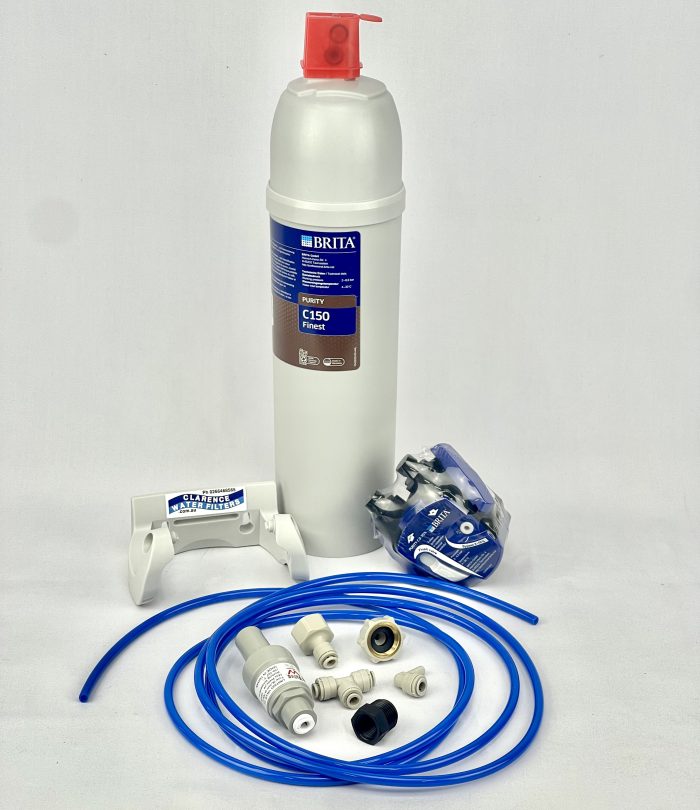
Why Having A Coffee Machine Water Filter Is Essential
August 4, 2021 10:27 am Leave your thoughts
Brewing delicious shots of espresso or making the perfect café latte isn’t just about the quality of your coffee beans or the price tag on your coffee machine. It’s also about the quality of your water.
If your water contains chlorine, sediment, pesticides, heavy metals, chloramines, and other contaminants, it can ruin the taste of your coffee – regardless of the quality of your beans or your coffee machine.
Water contaminated with high levels of calcium carbonate or magnesium can also cause scale build up which can damage the internal components of your coffee machine. This might lead to expensive repairs or even worse — catastrophic failure.
If you own a commercial coffee shop, these issues are even more important to address as they can affect your livelihood.
In this guide, we are going to explain how water affects the quality of the coffee you make and how poor quality water can damage your coffee machine.
We’ll also help you understand how coffee water filters work and share some of the best coffee water filters on the market.
If you already know about the importance of using a coffee machine filter, jump to: What Is The Best Filtration System For Coffee?
Products Mentioned In this Guide
- Brita Cappuccino Espresso Coffee Machine Water Filter System
- Brita Purity C150 Quell ST Brita quick change filter cartridge
- Brita Purity C150 Finest Brita quick change filter cartridge
- Everpure 2CBGW (Gourmet Water)
- Everpure 4CB5-S EV9617-22 Scale Control 5 Micron
- Everpure 4FC-S Filter EV9691-76 Scale Inhibitor 0.5 Micron
- Everpure 7CB5-K Filter EV9617-76 5 Micron
- QMP34TUS PS5 Phos/GAC Kit Twin Housing Food Service System
Contents
Why The Quality Of Your Water Matters
What Is The Best Water For Coffee?
Other Contaminants Which Can Affect Coffee Taste and Odour
Understanding Water Hardness
Contaminants That Can Damage Your Coffee Machine
How Do Coffee Water Filters Work?
What Is The Best Filtration System For Coffee?
Why The Quality Of Your Water Matters
Even if you are using the finest Arabica beans in the world or an espresso machine worth thousands of dollars, the quality of the water you use will matter.
Water quality is important because it acts as the primary solvent in the coffee making process and is the main carrier of flavour within your cup of coffee.
It is solely responsible for extracting the delicious flavours and aromas from your beans which make your brew enjoyable.
To dissolve flavour compounds in your coffee beans, water has to form chemical bonds with solids and carry them away.
If your water is contaminated, it can interfere with this process, potentially leading to detrimental changes in your brew.
Those detrimental changes can include:
- Flavour
Unfiltered water can contain particulate matter, chemical residue, chlorine and organic molecules which add a distinctive (and unwanted) flavour to your brew. - Aroma
If your water contains strong smelling chemicals like chlorine, chloramines, and hydrogen sulphide, it can interfere with the aroma of your brew and ruin the coffee drinking experience. Other contaminants like sediment, algae, rust, iron, and silt can also impact the aroma of your coffee. - Mouthfeel
The mouthfeel of coffee is its viscosity, heaviness, and richness. Chalky residues, particulate matter, and chemicals can impact these characteristics, changing how your coffee feels in your mouth. - Acidity
Acidity is important in coffee as it gives your brew a lively, sharp flavour. If the pH of your water is overly acidic or alkaline due to contamination, it can change how you perceive your coffee’s flavours and give it an unbalanced taste.
If you are still unsure about the importance of having good water, remember that water makes up 98% of a shot of espresso. Any bad odours or flavours in your water will be present in your coffee.
In other words, if you don’t have great water, you will never make great coffee.
What Is The Best Water For Coffee?
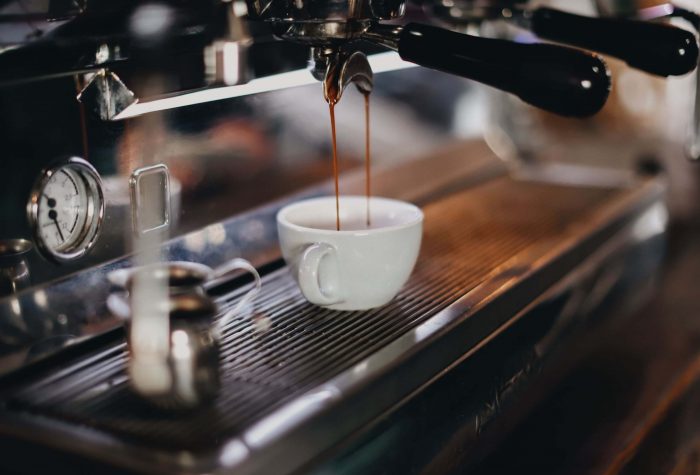
The ideal water for making a cup of coffee should be odourless and crystal clear. It won’t contain chlorine, pesticides, sediment, and other contaminants often found in Australian drinking water. Its Total Dissolved Solids should be 150 mg/L TDS or less and its pH should be close to 7 (neutral).
Water of this quality will be able to fully extract the delicious flavours and aromas from coffee beans without adding any unnatural taste or odour. It will help you obtain the very best outcome possible from your coffee bean of choice.
Coffee organisations like the Speciality Coffee Association (SCA) have released information on the ideal attributes for water. They suggest the ideal water has the following characteristics:
|
Characteristic |
Target |
Acceptable Range |
|
Odour |
Clean Fresh / Odour Free |
|
|
Chlorine |
None |
None |
|
Calcium Hardness |
50-175 ppm CaCO3 |
50-175 ppm CaCO3 |
|
Alkalinity |
40 ppm |
At or near 40-70 ppm |
|
pH |
7 |
6-8 |
|
TDS |
150 mg/L |
75 to 250 mg/L |
The SCA combines these standards with standards for water temperature, water-to-coffee ratio, grind size, and coffer-to-water contact time for their “Golden Cup Standard” for brewing coffee. Read more on SCA coffee standards.
Here is a little more information about each characteristic mentioned by the SCA:
Odour
The rich aroma of coffee is one of its most enjoyable aspects. Unfortunately, like chlorine and hydrogen sulfide can can interfere with the way coffee smells and ruin the experience of drinking coffee.
Chlorine
The SCA recommends removing chlorine from coffee water because of the strong chemical taste it can add. The presence of chlorine can also reduce the pH balance of your coffee, making it overly acidic. This might negatively impact the mouthfeel of your coffee.
Although the the SCA suggests 100% removal, it is difficult to achieve. Virtually all coffee water filters will only remove between 99.9% to 99.999% of chlorine from water. However, at this point, it is impossible for humans to detect any chlorine taste or odour.
Calcium Hardness
Calcium hardness refers to the presence of calcium ions in water (as CaCO3, calcium carbonate).
Water that has very low levels of calcium carbonate will produce a brew that is lifeless and flat tasting.
Brewing with water that has very high calcium levels creates another set of problems. For starters, it becomes more difficult to extract all of the flavours and aromas from your coffee beans, creating a diluted and bland-tasting shot.
Calcium carbonate can also precipitate out of the water, forming a hard white crust called limescale. This occurs at a faster rate if the water is frequently heated and cooled, as it will be while in the boiler.
Over time, scale build-up can choke the pipes in your espresso machine and cause a loss of water pressure.
Heating elements can also become caked in scale which affects their performance. You may find that your coffee machine struggles to reach the ideal temperature for brewing, which reduces the amount of flavour extracted from the bean.
The challenging aspect of dealing with calcium is that it has both benefits and drawbacks. It is needed to make a great-tasting cup of coffee, but too much can damage your coffee machine.
Dissolved magnesium carbonates can also form scale, but are generally found in much lower levels in water.
How Much Calcium is Ideal?
The SCA recommends that you have 50-175 ppm calcium to achieve a brew that is bright tasting and balanced.
This is one of the reasons why coffee filter systems like the Brita PURITY C head system use a 0-70% bypass, which gives brewers fine control over water hardness.
You can use a setting which protects your coffee machine while still allowing some minerals through to create a vibrant brew.
The Quell ST range of Brita filters can use any hardness setting while the Brita Finest is set at Zero for the best protection of your coffee equipment (recommended when in areas with very hard water or other mineral contaminants like chlorides, sulfates, or nitrates).
Other Contaminants Which Can Affect Coffee Taste and Odour
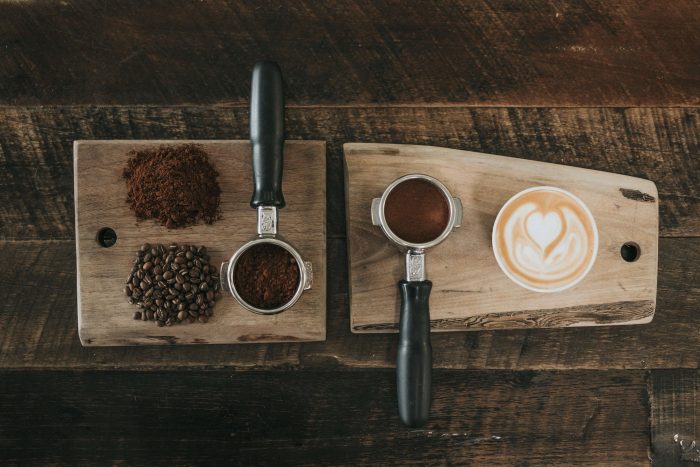
There are several other contaminants which can impact the flavour of your coffee, including:
- Sediment
Sediment can change the flavour of coffee and affect its appearance. Two of the most common sediments which can alter flavour are iron and manganese. They can make coffee taste bitter and change its mouthfeel.
Sediment particles can also accumulate in your coffee machine’s boilers and may even block your steam wand – leading to expensive repairs. The term turbidity is used to describe the amount of dirt, silt, sand, and other materials in water. - Calcium and Magnesium
Having excessive quantities of these minerals in the water can cause flavour compounds to clump together. This can alter the flavour of your coffee significantly. - Herbicides and pesticides
Many Australian water reservoirs are surrounded by farmland. Unfortunately, this means they can become contaminated by a variety of herbicides and pesticides which alter the quality of your water. Farmland run off can include nitrates. Carbon filtration usually does a fantastic job of reducing these types of contaminants. - Volatile organic compounds (VOCs)
Volatile organic compounds are chemicals found in everything from paint chips to plastics. The most common VOCs include Australia benzene, ethylene glycol, formaldehyde, methylene chloride, tetrachloroethylene, toluene, xylene, and 1,3-butadiene. Some of these compounds can alter the flavour of water significantly, which can have a flow on effect on the quality of your cup of coffee. Some VOCs are quite toxic for humans and should be avoided as much as possible.
Contaminants Which Can Damage Your Coffee Machine
There are several water contaminants which can damage your espresso machine over time. Dealing with these contaminants is particularly important for coffee shops, as they are processing large amounts of water through very expensive coffee machines. Some common contaminants which pose a risk to coffee machines include:
Rust and Sediment
Rust and sediment present in the water that you introduce to your coffee machine can eventually settle in the machine’s boilers. This can increase the risk of corrosion in the boiler and blockages in the coffee machine’s pipes or steam wand.
Acidic Water (Low pH)
If your water has high levels of chlorine present, it may become very acidic. In some cases, this may cause the metal parts of your coffee machine to corrode. This can shorten the lifespan of your coffee machine.
Scale Build-up (Limescale)
As mentioned earlier, Scale occurs when calcium and magnesium salts solidify to create a hard, off-white chalky substance. This substance can build up on the metal components within a coffee machine, including the machines pipes, boiler, and steam wand.
Scale can eventually coat the pipes within your coffee machine, causing it to perform poorly. In extreme cases, pipes can become blocked, which can lead to malfunction. If you have an expensive coffee machine, this means an extremely expensive repair bill.
Most coffee aficionados will clean their coffee machines using descaling chemicals to prevent long-term damage from scale.
However, the safest approach is to use a water filter which makes it more difficult for these minerals to form scale in the first place – particularly if you are running a coffee shop with several expensive machines.
More On Water Hardness
Because high levels of water hardness is so damaging to coffee machines, its worth taking a closer look at it, particularly if you are in an area with hard water like WA, SA, or the NT.
Hardness refers to the level of mineral salts in a solution. Water with high levels of these minerals will be considered harder.
There are two types of hardness:
- Carbonate hardness (Temporary hardness)
This primarily refers to calcium and magnesium bicarbonates that are dissolved in the water. When these compounds are heated, they can create the solid carbonate known as scale or limescale. Referred to as Temporary Hardness as it will precipitate out of water to form scale when the water is boiled. - Non-carbonate Hardness
This refers to calcium and magnesium nitrates, chlorides, and sulfates. This includes calcium chloride (CaCl2), magnesium chloride (MgCl2), and magnesium sulfate (MgSO4)
“Total Hardness” refers to carbonate hardness and non-carbonate hardness combined. It also includes other mineral salts including iron, strontiuim, and manganese.
Although the focus is usually on carbonate hardness as it causes damaging limescale, non-carbonate hardness can also be an issue when it reaches high levels.
High levels of calcium and magnesium chlorides, for example, can damage stainless steel surfaces and leech out metals. This is especially problematic if you have a boiler made from stainless steel.
Areas with very hard water are more likely to have both carbonate and non-carbonate hardness. If you are in a location with hard water, you will need to use a filter which uses ion exchange, KDF, and/or polyphosphate.
Hardness can be removed from water via precipitation or ion exchange. Some of the minerals salts that cause hardness can also be sequestered or isolated using polyphosphate, so they can’t form scale as easily.
Hardness vs Alkalinity
Hardness is the sum of the mineral salts in a solution, while alkalinity is a measure of the solution’s ability to neutralize acids (using hydroxide, carbonate, and bicarbonates). This means you can test your water’s alkalinity to get a reasonable estimation of your water’s hardness.
How Do Coffee Water Filters Work?
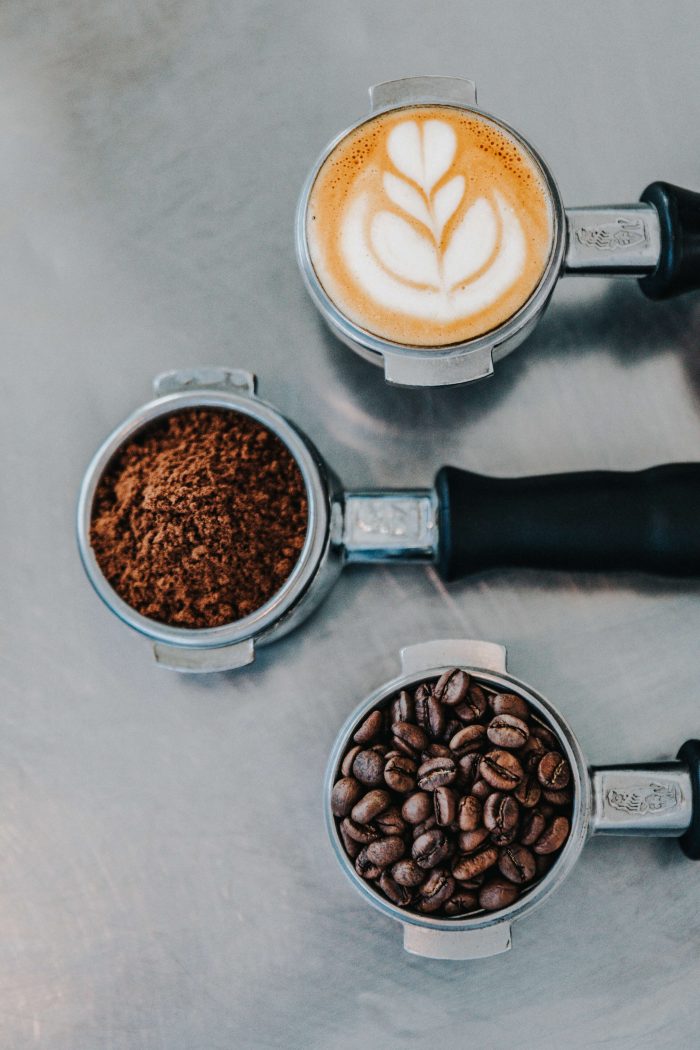
Coffee water filters are designed to reduce the amount of contaminants in water in order to achieve ideal brewing quality.
They also have scale inhibitors to protect your coffee machine from scale-related damage. Most coffee water filters use a combination of the following filtration techniques:
Mechanical Filtration
The filtration media acts like a sieve, blocking contaminants which are larger than the holes in the filtration media. This is a simple and effective way to block sediment, algae, dirt, and metal particles.
Sediment filters can be made from a variety of materials including food grade polypropylene and metal mesh.
Most coffee filters will use mechanical filtration as the first stage of their filtration process. This approach reduces these contaminants before they can clog up the carbon block or granular activated carbon used in subsequent stages.
Adsorption Filtration
This type of media can adsorb contaminants from water as they flow past. The most common material used for absorption filtration is Activated Carbon.
Activated Carbon has microscopic pores on its surface which trap chlorine, metal, sediment, VOCs, pesticides, herbicides, and other contaminants. After several months, the carbon’s pores become full and the filter will need to be replaced.
Sequestration
Sequestration water filters work by chemically isolating a contaminant. The most common form of sequestration filtration media contained within coffee filters is polyphosphate.
Polyphosphate sequesters (binds up) contaminants so they maintain their solubility in water. Polyphosphate is primarily used in coffee filters to bind up calcium and magnesium, so it cannot harden to form scale.
Ion Exchange
Ion exchange resin is bead-like substance made from an organic polymer substrate.
The resin beads are porous, providing a large surface area with tiny cracks capable of trapping and releasing ions (particles, atoms or molecules with a net electrical charge).
Ion exchange resin is very effective at trapping contaminants like magnesium and calcium carbonate, which are primarily responsible for scale.
The resin will exchange the ions found in hard water for sodium or hydrogen ions, which are completely harmless.
Electron Exchange (Redox Filtration Media)
Some forms of filtration media use electrochemical reactions to filter water. These products exchange electrons with the contaminants in your water, turning them into compounds that are harmless for human consumption. This chemical process is called an oxidation/reduction (redox) reaction.
KDF55 is the most common form of media which uses the redox process. It is a 50/50 blend of copper and zinc. As oxygenated water flows through this combination of metals, an electrochemical reaction causes contaminants to either loose or gain electrons.
Chlorine, for example, will lose electrons to the copper molecules, which causes it to turn into chloride – an inert compound with very little taste and odour. It can even reduce scale by converting the crystal structure of calcium carbonate, changing it into aragonite.
What Is The Best Filtration System For Coffee?
We stock several coffee water filtration systems from a variety of manufacturers. These systems are specifically designed to improve the quality of your water to enhance the flavour and aroma of your coffee.
They also protect your coffee machine by reducing the build-up of scale. Our best sellers include:
Brita Cappuccino Espresso Coffee Machine Water Filter System
Brita has established a reputation as being one of the leaders in the coffee water filtration market. Their Brita Purity C filter range does a brilliant job of eliminating contaminants which can affect the flavour and aroma of coffee.
This range uses the Purity C head system. It is an innovative system with a 0-70% bypass for varying the amount of water hardness when using Purity C Quell ST filters. This gives baristas a fine level of control over the quality of their water, helping them make the ultimate brew.
This adjustable system also makes it easier to maximise the lifespan of your filters. If you live in an area with reasonably soft water, you can increase the bypass level, preserving the resin in the filter.
Regardless of your chosen bypass setting, the filter will always be reducing sediment, dirt, chlorine taste and odours.
The ‘Finest’ cartridges are designed to have a 0% bypass for complete hardness reduction. This option is ideal for baristas with very hard water who want to protect their espresso machine from damage and are recommended for Stainless Steel boilers.
This system is available with several different filter sizes, which makes it simple to find a filter that suits your available space, budget, and usage. The kit comes with:
- Filter cartridge
- 1/2″ bsp female thread water inlet tap fitting or an angle stop valve
- 3 metres high pressure tubing
- 350 kpa pressure limiting and non return valve to protect your machine\
- Brita Purity C Head with swing out bracket and fittings.
The Brita Cappuccino Espresso Coffee Machine Water Filter System is incredibly easy to install, as it uses push in tube fittings.
The inlet side has 1/4″ tube fitting and the outlet side has 3/8″ bsp male thread with a 1/2″ male bush adaptor. Read more about the Brita Cappuccino Espresso Coffee Machine Water Filter System.
Here is a quick overview of the most popular Brita filters amongst coffee aficionados:
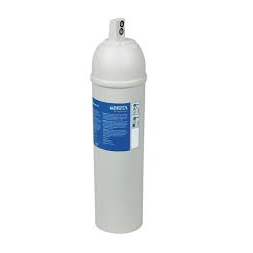
Brita Purity C150 Quell ST Brita quick change filter cartridge
This is a four stage filter ideal for coffee and espresso machines, vending machines, and ovens.
The first stage is a pre-filter which reduces coarse particles like rust, sediment, algae, and sand. Stage 2 uses ion exchange to reduce calcium carbonate hardness, preventing scale deposits on your coffee machine.
The next stage is a carbon block filter which improves the taste and odour of your coffee by reducing contaminants like chlorine, chlorine by-products, pesticides, and other chemicals. The final stage is a very fine filter to reduce particles measuring above 10 µm.
The purity head system allows users to selectively set how much calcium, magnesium and metal ions are reduced from your water. Ideal for tweaking the flavour of your coffee.
This is a medium size filter ideal for home users who make lots of coffee and small offices. Dimensions 410mm overall x 102mm across. Read more.
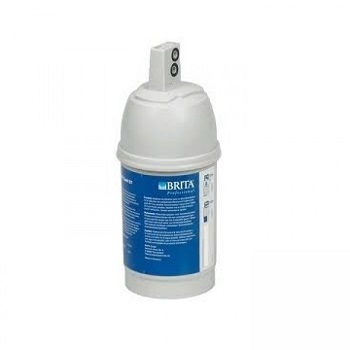
Brita Purity C50 Quell ST Water Filter
The Brita C50 Quell ST is a more compact option popular amongst home coffee enthusiasts looking for an affordable and easy-to-install solution. It works in the same way as the larger Brita Purity filters, with four stages of filtration.
It does a wonderful job of improving the taste and odour of coffee as well as protecting your appliances. The dimensions are only 260mm overall x 102mm across which makes it a useful choice for people with limited under bench space. Read more.
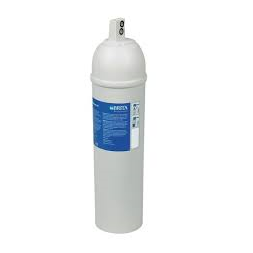
Brita Purity C150 Finest Water Filter
The Brita Purity Finest filters are designed for maximum protection against scale, making them a popular choice in areas with hard water. They are run on 0% bypass to maximise protection against limescale and gypsum deposits in the downstream appliance.
The C150 does a wonderful job at removing the contaminants which impair the smell and taste of coffee, including chlorine, sediment, and volatile organic compounds. It has a capacity 1833 litres at 105 mgl of Carbonate Hardness (Head setting 0%). Dimensions 410mm overall x 102mm across. Read more.
Everpure Filters
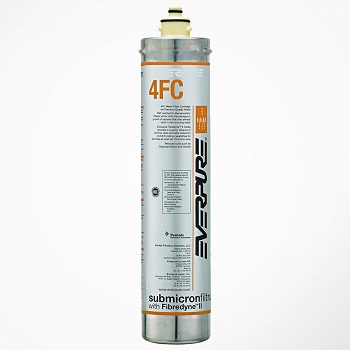
Everpure are another dominant player in the coffee water filtration market in Australia. They are an American company known for making high quality filters that have robust metal housings.
Many coffee shops around Australia choose Everpure filters because of their reliability, affordability, and easily availability.
Everpure coffee filters work with the Everpure QL1, Everpure QL2, and QL3 heads. These heads are available with a variety of inlet and outlet connections including 3/8” BSP female threads and push in John Guest style fittings that suit ¼” or 3/8” tubing.
There are many different Everpure filters to choose from with different sizes and capabilities. However, the most popular options amongst baristas are the:
- Everpure 2CBGW (Gourmet Water)
The 2CBGW has been one of Everpure’s most popular coffee filters since its inception. It is a 5 micron carbon block filter with polyphosphate for scale reduction. The 2CBGW will reduce Dirt, Rust, Sediment Particles, Chemicals, Chlorine, Bad Taste, Odours and Scale build up. It is ideal for premium single cup coffee machines. - Everpure 4CB5-S EV9617-22 Scale Control 5 Micron
The 4CB5-S is a popular option amongst professionals looking for a reliable triple action filter. It includes a mechanical sediment filter, 5 micron carbon block, and KDF-55 component. It does a great job of reducing chlorine, sediment, VOCs, and chemicals, as well as protecting machines form scale build up. - Everpure 4FC-S Filter EV9691-76 Scale Inhibitor 0.5 Micron
This is a technologically advanced triple action filter which features Everpure’s new Fibredyne technology. Fibredyne is a new form of carbon which has a much higher absorption capacity and faster flow rate compared to activated carbon. This filter is sub micron, which means it can provide protection against Cyst parasites like Giardia and Cryptosporidium. It will reduce Dirt, Rust, Sediment Particles, Chemicals, Chlorine and many other common contaminants from water. - Everpure 7CB5-K Filter EV9617-76 5 Micron
This is a large triple action filter which contains sediment, carbon, and KDF55 filtration sections. It has a recommended service life of 12 months with 56871 litres of Chlorine reduction capacity. The Everpure 7CB5-K can reduce Dirt, Rust, Sediment Particles, Chemicals, Chlorine, VOCs and other common contaminants. Dimensions 370mm x 78mm. Ideal for commercial operating environments.
View our full range of Everpure filters.
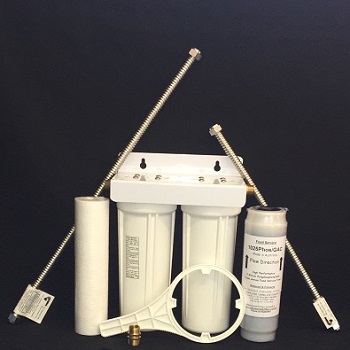
QMP34TUS PS5 Phos/GAC Kit Twin Housing Food Service System
This system uses a USA-made QMP Twin Housing which takes standard 10” x 2.5” filters. The first stage of the system is a 1025PS5 poly spun 5 micron sediment filter. This filter will reduce dirt, rust, algae, sand, silt, metals, and other various types of sediment. It also protects the second filter in the chain.
The second filter is a 1025PHOS/GAC. It contains granular activated carbon which reduces chlorine, VOCs, bad tastes and odours, and chemicals. This followed by polyphosphate, which sequesters dissolved calcium salts in the water, preventing them from forming scale on your coffee machine.
It is a high flow system that comes with Mega Flow S/S braided flex hoses and fittings. You simply screw it onto your ½” water outlet and connect it to your appliance.
Replacement filters are quite affordable, which makes it a great choice for budget conscious coffee hobbyists, coffee shops, and commercial kitchens. Triple systems are also available, which allow for a finer level of filtration. Read more.
Frequently Asked Questions
What Are Water Softener Filters?
Water softener filters reduce the carbonate hardness of water to prevent scale build-up.
They work by sequestering, changing the form of, or exchanging the calcium/magnesium carbonates and bicarbonates which are responsible for scale accumulation.
Polyphosphate is often used to sequester calcium/magnesium in water softeners. It wraps up the carbonate ions, so they can’t form scale as easily.
KDF is a blend of copper and zinc that changes the form of calcium ions as they flow past. It turns calcium to change into aragonite, which will not form scale.
Ion exchange resins will absorb calcium/magnesium ions and exchange them with harmless molecules.
All coffee machine filters should have some kind of softening capacity, to ensure your machine is safe from scale build-up. If you live in an area with hard water it is absolutely critical that you use a coffee machine filter with water softener capabilities.
Water softeners do not reduce permanent hardness (chlorides, sulfates, and nitrates). High levels of these molecules can be corrosive and impact the taste/odour of coffee.
If you are in an area with high total hardness, a water softener may be insufficient and you may require a product that addresses total hardness.
What Is The Best Coffee Machine Water Filter For Hard Water?
If you are in an area with very hard water, you will need a filter with excellent water softening capabilities.
In terms of Brita, you would use the ‘Finest’ variant as it reduces total hardness. This means it will reduce calcium and magnesium nitrates, chlorides, and sulfates — in addition to calcium and magnesium carbonates.
Wrapping Up
Hopefully this article has demonstrated the importance of filtering your coffee water. It can dramatically improve the flavour and aroma of your coffee and helps to protect your appliances.
Water quality varies greatly in different areas and this will determine the type of filter and the service life.
For more information, get in touch with us today.
Clarence Water Filters Pty Ltd
Phone: 02 6646 8565
Email: sales@clarencewaterfilters.com.au
Tags: Brita, Coffee, Coffee Water, Coffee Water Filters, Coffee Water Filtration, Everpure, Polyphosphate, Scale
Categorised in: Coffee Filtration, Water Filtration
This post was written by Greg

